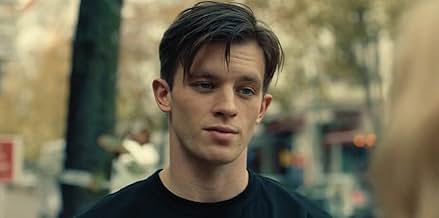NOTE IMDb
5,6/10
1,7 k
MA NOTE
Maxi, un rescapé d'une attaque terroriste, rejoint l'étudiant séduisant Karl et fait partie d'un mouvement de jeunesse européen; celui qui vise la prise du pouvoir.Maxi, un rescapé d'une attaque terroriste, rejoint l'étudiant séduisant Karl et fait partie d'un mouvement de jeunesse européen; celui qui vise la prise du pouvoir.Maxi, un rescapé d'une attaque terroriste, rejoint l'étudiant séduisant Karl et fait partie d'un mouvement de jeunesse européen; celui qui vise la prise du pouvoir.
- Réalisation
- Scénario
- Casting principal
- Récompenses
- 1 victoire et 6 nominations au total
Avis à la une
Summary
Christian Schwochow's film is a disturbingly topical dystopia, an incursion into the renewed modes and operations of the new neo-fascist youth movements in Europe and which find their replicas in other parts of the world, such as the so-called "libertarians" of Argentina. For instance. A pan-European phenomenon with TED conventions and progressive clothes and manners that will reveal, with the excuse of insecurity, his white supremacist motivations against immigrants and his vocation for power. And that raises a question: how solid do our principles stand when we become victims?
Review
After suffering a family loss, Maxi, a young student (Luna Wedler) is seduced by Karl, a young far-right activist (Jannis Niewöhnner) and introduced into a European neo-fascist youth movement.
Maxi is seduced by the beautiful Karl (a Machiavellian Jannis Niewöhnner, in a character reminiscent of the protagonist of Hater) and invites her to meet Re / Generation, an organization for "change". To what extent will someone who is processing a grief allow themselves to be used? Will it follow the path of the protagonist of the film Hadewijch, by Dumont? What ideological changes can the condition of victim produce? Luna Wedler (the protagonist of the Biohackers series) deals with an ambiguity that makes her character very interesting. The opposite of her is Alex, her father (great performance by Milan Peschel), who has other ways of processing a duel that will distance them.
Beyond some script weaknesses, Christian Schwochow's film is a disturbing foray into the renewed modes and operations of the new neo-fascist youth movements in Europe. It should be noted that the phenomenon is not limited to the Old Continent, since it finds its replica in the so-called "libertarians" of Argentina, for example.
We are far from the world of proletarian neo-fascists sons of German reunification. It is now about organizations (in this case the fictitious Re / Generation; attention with its logo) to which middle class young people adhere, many of them students, who organize conventions with TED talks and new age airs, making intensive use of social networks and who spuriously seize slogans, topics and ways of the progressive left. The mask of false progressivism does not take long to fall and show its true face, its obsession and its fanaticism: a pan-European white supremacism whose target is immigrants and which agitates the issue of "insecurity" and "change"; It is a phenomenon that does not end in watertight nationalisms because "they - immigrants - are everywhere." The film, focused on young people, leaves out of the field the economic interests that move behind and that sustain these movements and groups, very organized and with a vocation for power, and who do not repair the means to achieve it.
Je suis Karl describes a real state of affairs and goes one step further, painting a disturbingly topical dystopia.
Christian Schwochow's film is a disturbingly topical dystopia, an incursion into the renewed modes and operations of the new neo-fascist youth movements in Europe and which find their replicas in other parts of the world, such as the so-called "libertarians" of Argentina. For instance. A pan-European phenomenon with TED conventions and progressive clothes and manners that will reveal, with the excuse of insecurity, his white supremacist motivations against immigrants and his vocation for power. And that raises a question: how solid do our principles stand when we become victims?
Review
After suffering a family loss, Maxi, a young student (Luna Wedler) is seduced by Karl, a young far-right activist (Jannis Niewöhnner) and introduced into a European neo-fascist youth movement.
Maxi is seduced by the beautiful Karl (a Machiavellian Jannis Niewöhnner, in a character reminiscent of the protagonist of Hater) and invites her to meet Re / Generation, an organization for "change". To what extent will someone who is processing a grief allow themselves to be used? Will it follow the path of the protagonist of the film Hadewijch, by Dumont? What ideological changes can the condition of victim produce? Luna Wedler (the protagonist of the Biohackers series) deals with an ambiguity that makes her character very interesting. The opposite of her is Alex, her father (great performance by Milan Peschel), who has other ways of processing a duel that will distance them.
Beyond some script weaknesses, Christian Schwochow's film is a disturbing foray into the renewed modes and operations of the new neo-fascist youth movements in Europe. It should be noted that the phenomenon is not limited to the Old Continent, since it finds its replica in the so-called "libertarians" of Argentina, for example.
We are far from the world of proletarian neo-fascists sons of German reunification. It is now about organizations (in this case the fictitious Re / Generation; attention with its logo) to which middle class young people adhere, many of them students, who organize conventions with TED talks and new age airs, making intensive use of social networks and who spuriously seize slogans, topics and ways of the progressive left. The mask of false progressivism does not take long to fall and show its true face, its obsession and its fanaticism: a pan-European white supremacism whose target is immigrants and which agitates the issue of "insecurity" and "change"; It is a phenomenon that does not end in watertight nationalisms because "they - immigrants - are everywhere." The film, focused on young people, leaves out of the field the economic interests that move behind and that sustain these movements and groups, very organized and with a vocation for power, and who do not repair the means to achieve it.
Je suis Karl describes a real state of affairs and goes one step further, painting a disturbingly topical dystopia.
6OJT
I take the bad reviews here are due to this film either not are being understood, or that some refuse to take it in - the danger of youth wanting to change society from what it is today, maybe drastically. It's not a coincidence this film is made by Germans. It comes with a warning.
A reference to this film would be The Wave, which is filmed both by Amercans and Germans, based on a true story.
This movie starts off very interesting, and within 15 minutes I'm sold.
We see a young couple driving across the border into Germany hiding a refugee which they smuggle in. Then we wind maybe 20 years forward, where we see the same family being freak hit by a terrorist attack. And this leads to us following the daughter Maxi and father being left broken. The daughter is being approached by journalists and others, among them a very charming an pretty young man, in whom she involves.
The film is well mde, but doesn't overexplain. It's down to you as a viewer to decide what you see. I think many modern viewers watch movies while they look at their mobile phones. This makes them need aoverexplaining to get the point of a movie. They are easily confused by narratives and jumps in time.
This film gives warnings. Warnings which makes me think of the environmental movement more than nazi- or terrorist-movements, but this is fiction which comes with a warning, put into an interesting story. Just watch it with an open mind!
A reference to this film would be The Wave, which is filmed both by Amercans and Germans, based on a true story.
This movie starts off very interesting, and within 15 minutes I'm sold.
We see a young couple driving across the border into Germany hiding a refugee which they smuggle in. Then we wind maybe 20 years forward, where we see the same family being freak hit by a terrorist attack. And this leads to us following the daughter Maxi and father being left broken. The daughter is being approached by journalists and others, among them a very charming an pretty young man, in whom she involves.
The film is well mde, but doesn't overexplain. It's down to you as a viewer to decide what you see. I think many modern viewers watch movies while they look at their mobile phones. This makes them need aoverexplaining to get the point of a movie. They are easily confused by narratives and jumps in time.
This film gives warnings. Warnings which makes me think of the environmental movement more than nazi- or terrorist-movements, but this is fiction which comes with a warning, put into an interesting story. Just watch it with an open mind!
I rated this film 6/10 because of its sensitive and believable build up of how someone might be drawn into "the scene".
Radicalisation of any kind starts with either desperation or charm. The film builds this up slowly and sensitively, with a youth scene which is attractive and seemingly advocating a "new" right movement. This part was well handled and explained. The ending seemed glib, rushed and unbelievable. The actors were charismatic and deserve credit.
Radicalisation of any kind starts with either desperation or charm. The film builds this up slowly and sensitively, with a youth scene which is attractive and seemingly advocating a "new" right movement. This part was well handled and explained. The ending seemed glib, rushed and unbelievable. The actors were charismatic and deserve credit.
Je Suis Karl may be cliched in many respects but the movie does represent the chaos, confusion and resultant dangers of our times.
A scared, young survivor of an attack becomes another victim of a radical, extremist group plotting to shift opinion through the savvy use of social media.
For some, the film will be an eye opener about the lengths to which some groups are willing - and able - to go to further their political agendas.
Je Suis Karl is a believable story set in the backdrop of the political polarization found not only in Europe but across many parts of the world.
The movie may move slowly initially but the story picks up pace as the plot unfolds. A worthwhile film for the politically inclined film goer.
A scared, young survivor of an attack becomes another victim of a radical, extremist group plotting to shift opinion through the savvy use of social media.
For some, the film will be an eye opener about the lengths to which some groups are willing - and able - to go to further their political agendas.
Je Suis Karl is a believable story set in the backdrop of the political polarization found not only in Europe but across many parts of the world.
The movie may move slowly initially but the story picks up pace as the plot unfolds. A worthwhile film for the politically inclined film goer.
Not an easy subject matter - but the message is clear. And violence never is the answer ... uncertainty isn't either. But it is something that some people are able to tap into. If you are afraid, if you think certain things may happen, if the press is reporting on things ... you may be subject to something ... you may be used for something ... and you may become the face (or name, no pun intended) - unintentionally.
Rough on the edges and within, this has quite a few issues - again no pun intended. I wanted to watch this at the cinema, but was not able to go there. So now that it was released for home viewing, I did just that. Maybe in cinemas I would not have noticed some of the flaws, but I reckon I would have there too. The pace is a bit all over the place - still the issue at hand is more than important.
Rough on the edges and within, this has quite a few issues - again no pun intended. I wanted to watch this at the cinema, but was not able to go there. So now that it was released for home viewing, I did just that. Maybe in cinemas I would not have noticed some of the flaws, but I reckon I would have there too. The pace is a bit all over the place - still the issue at hand is more than important.
Le saviez-vous
- Citations
Karl: What matters most to you?
Maxi Baier: Trust. What is the worst thing in the world for you?
Karl: To die for no reason.
Maxi Baier: And the best?
Karl: To die with purpose.
Meilleurs choix
Connectez-vous pour évaluer et suivre la liste de favoris afin de recevoir des recommandations personnalisées
- How long is Je Suis Karl?Alimenté par Alexa
Détails
- Durée2 heures 6 minutes
- Couleur
- Rapport de forme
- 2.35 : 1
Contribuer à cette page
Suggérer une modification ou ajouter du contenu manquant

Lacune principale
By what name was Je suis Karl (2021) officially released in Canada in English?
Répondre
![Regarder Trailer [OVS]](https://m.media-amazon.com/images/M/MV5BMTdjMTA1MjYtYmZkMy00MTE0LTk3MGItYjdhM2M3ZjgxYzNlXkEyXkFqcGdeQXRyYW5zY29kZS13b3JrZmxvdw@@._V1_QL75_UX500_CR0)



























